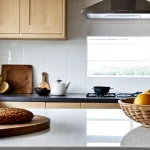Sustainability Driving Modern UK Kitchen Design
Sustainability has become a cornerstone in modern UK kitchen design, reflecting growing consumer demand for eco-conscious solutions. Across the UK, sustainable kitchen trends prioritize materials and technologies that reduce environmental impact without sacrificing style or functionality. Homeowners increasingly seek green kitchen design elements that incorporate recycled or renewable materials, such as bamboo cabinetry or low-VOC finishes, addressing concerns about both resource use and indoor air quality.
Eco-friendly kitchen innovations now include energy-efficient appliances and smart water-saving fixtures, which directly influence purchasing decisions. The market’s shift towards sustainability means designers and suppliers offer more options that meet these requirements, creating a cycle where demand and availability reinforce each other. This transformation extends beyond aesthetics: from sourcing to installation, each step is scrutinized to reduce carbon footprint.
Also read : How are UK kitchen designers addressing the need for energy efficiency?
The tangible impact of these trends is evident. Renovators report prioritizing suppliers with strong environmental credentials and often choosing modular designs that extend product lifespan. To align with consumer values, businesses integrate sustainability certifications into their marketing, helping UK homeowners make informed, responsible choices without compromising their vision for a beautiful kitchen space.
Embracing Sustainable Materials in Kitchens
Sustainable cabinetry made from recycled kitchen materials is transforming modern kitchen design. Homeowners increasingly prefer cabinets crafted from reclaimed wood or recycled composites, significantly reducing environmental impact. These options not only divert waste from landfills but also offer unique textures and character.
In parallel : How is the UK Culinary Scene Adapting to Global Trends?
Eco-friendly countertops are another key element in sustainable kitchens. Materials such as recycled glass, bamboo composites, and sustainably sourced quartz provide durability without compromising environmental standards. These surfaces resist stains and scratches while maintaining a low footprint.
Choosing finishes that use low-VOC (volatile organic compounds) and non-toxic treatments ensures indoor air quality stays healthy. These finishes emit fewer harmful chemicals, benefiting both the environment and residents’ health.
In the UK, several projects highlight the effective use of recycled kitchen materials. One case study involves a London apartment featuring cabinetry made entirely from reclaimed timber paired with recycled glass countertops. This approach brought character and sustainability together seamlessly. Advancements in sustainable cabinetry and countertop options are making eco-friendly kitchens not just achievable but highly desirable.
Integrating Eco-Friendly Appliances and Technology
Incorporating energy-efficient kitchen appliances is a key trend for sustainable homes. These appliances use advanced technology to minimize electricity consumption while maintaining high performance, significantly reducing household energy bills. Many models are now designed with eco-conscious consumers in mind, balancing durability and energy savings seamlessly.
Smart kitchen tech further promotes sustainability by optimizing appliance usage. For instance, smart ovens and refrigerators can adjust their energy consumption based on usage patterns, avoiding waste. Additionally, connected devices can send alerts about maintenance needs, preventing inefficient operation and extending appliance lifespan.
Equally important are water-saving solutions fitted in modern kitchens. Low-flow faucets and sensor-activated fittings reduce water wastage without compromising user comfort. These fixtures contribute to lowering overall water consumption, an essential part of eco-friendly kitchen design.
Altogether, combining energy-efficient appliances, smart technology, and water-saving fixtures creates not only an environmentally responsible kitchen but also a highly functional and cost-effective space that supports everyday sustainable living.
Energy Efficiency as a Core Principle
Enhancing comfort and sustainability in kitchen design
Improving kitchen insulation plays a crucial role in reducing energy consumption. Proper insulation limits heat loss in winter and keeps the kitchen cooler in summer, ensuring stable temperatures and lowering heating and cooling costs. Materials like insulated wall panels and double-glazed windows are effective ways to enhance energy conservation in the kitchen space.
Switching to LED lighting offers a powerful yet simple upgrade. LED lights consume significantly less electricity compared to traditional bulbs, generate less heat, and have a longer lifespan. Integrating energy-efficient lighting solutions such as dimmable LED fixtures or motion sensors can further reduce energy use while maintaining a well-lit and comfortable kitchen environment.
Modern UK kitchens increasingly embrace renewable energy kitchens by incorporating solar panels or small wind turbines. These sources can power appliances or lighting, reducing dependence on the grid and lowering utility bills. Combining renewable energy with smart kitchen technology ensures a greener, energy-wise space that aligns with sustainability goals without compromising practicality or style.
Why Sustainability is Shaping UK Kitchen Design Choices
Sustainable living has become a key priority for eco-conscious homeowners in the UK, directly influencing modern kitchen design. Growing consumer awareness emphasizes not just aesthetics but also environmental impact, pushing manufacturers and designers to create kitchens that minimize waste and energy use.
Experts highlight several long-term benefits of sustainable kitchens. Beyond reducing carbon footprints, they offer enhanced durability through carefully chosen materials and energy-efficient appliances. This not only lowers utility bills but also extends the lifespan of kitchen components, creating financial savings alongside environmental ones. As a result, sustainable kitchen solutions are gaining significant traction.
Looking ahead, future kitchen trends in the UK market are expected to integrate even more innovative green technologies. From smart waste management systems to renewable energy integration, these kitchens will be designed to promote circular economy principles. It’s clear that embracing sustainability in kitchen design isn’t just a passing trend but a fundamental shift towards responsible living reflecting wider societal values across the UK. This ongoing evolution demonstrates how sustainability will remain central to kitchen design decisions for years to come.

